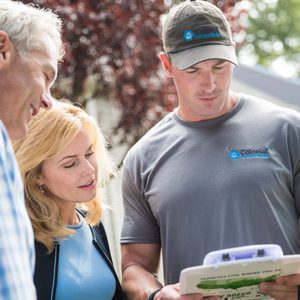Pest Control & Exterminator Services in Southborough, MA

Serving Worcester County since 1984
Southborough, MA, is a beautiful example of New England’s picturesque open countryside. Affluent properties abound with lots of open space, and even the scenic Sudbury Reservoir takes up some of the town’s area. In the town’s more active days, it served as a producer for various items, like boots and bonnets. But manufacturing eventually fell away, leaving room for this bedroom community to grow to about 9,000 people.
A great example of lasting traditions, the residents of Southborough participate in a collective non-partisan legislature process, which enables legislative actions through simple popular vote instead of by council chambers. One tradition that won’t last, though, is the prevalence of water-borne pests in the Southborough town proper. That tradition ended in 1984 with the creation of Colonial Pest Control. We’re Southborough’s answer to all pest problems, including the following insects and critters:
- Carpenter ants: These common insects are attracted to moist areas, especially the wood in your basement, attic, or garage. Other popular nesting spots are your deck or under your leaky roof where a lot of moisture collects. They’ll bore into the wood and leave smooth galleries and piles of sawdust on the floor below. We use technology called Microgen Microinjector to rid them from your home for good. Leaving a carpenter ant situation unaddressed could lead to dangerous and costly consequences.
- Pharaoh ants: These pests are attracted to any water source in the home, which could spell disaster for a house experiencing seasonal flooding or foundation damage. The pharaoh ant is yellow to reddish in color and doesn’t fly. Reproduction takes place in the colony, which is why you should call Colonial Pest Control right away if you spot them around your heating vents, electrical outlets, or water sources. Their colonies make a habit of splitting and moving into new locations, which can make it very difficult for the amateur exterminator to successfully eradicate them.
- Black Widow Spiders: These infamous pests don’t have an affinity for water, but you’ll find them in dark, damp places regardless. A Black Widow bite is dangerous as it secretes a powerful neurotoxin that causes pain and muscular contractions. They’re easily identified by their dark black coating with a red hourglass shape on the topside.
- Raccoons and opossums: These critters won’t be found in your basement or attic (hopefully!) but they will be found around your trash or compost pile. These scavengers forage for food wherever they can, including cities and forests. If you see one of these pests crossing the wide-open spaces of Southborough, keep an eye on it. If it enters your property often, call the experts at Colonial Pest Control to come out and take preventative measures to prevent them from returning. An opossum can carry rabies and play dead to confuse predators.
- Meadow voles: These little guys love to destroy landscaping and gardening. Between 4 and 8 inches long, these fatter mouse-like rodents will feed on seeds and seedlings, as well as fruits and vegetables. They also use shallow tunnels between food sources to avoid exposing themselves. Fortunately, they are rarely found inside the home, and if they are, they are unable to reproduce there. Still, call Colonial Pest Control today so our experts can eradicate your meadow vole problem before they give you financial heartache by tearing up your expensive plants and landscaping.
- European hornets: Another plant-destroyer, this variety of hornet will chew twigs and branches to create sap for their nests, which are also built out of organic plant matter. So far, these pests are rare in New England, but their size and colonizing potential (800 hornets or so) should not be overlooked. We have had instances of these hornets recently, so we’re well-experienced in handling these staunch homeland defenders.
- Yellow jacket: A more common bee-type insect is the yellow jacket. An aggressive an extremely dangerous flier, yellow jackets will build nests of comb enveloped in paper as reproduction increases. Be careful when mowing your lawn in the summer months, as an accidental encounter with a yellow jacket nest could become a horrifying experience. Call Colonial Pest Control at 1-800-525-8084 if you suspect a yellow jacket nest, especially if you have children or curious pets that play outside often.